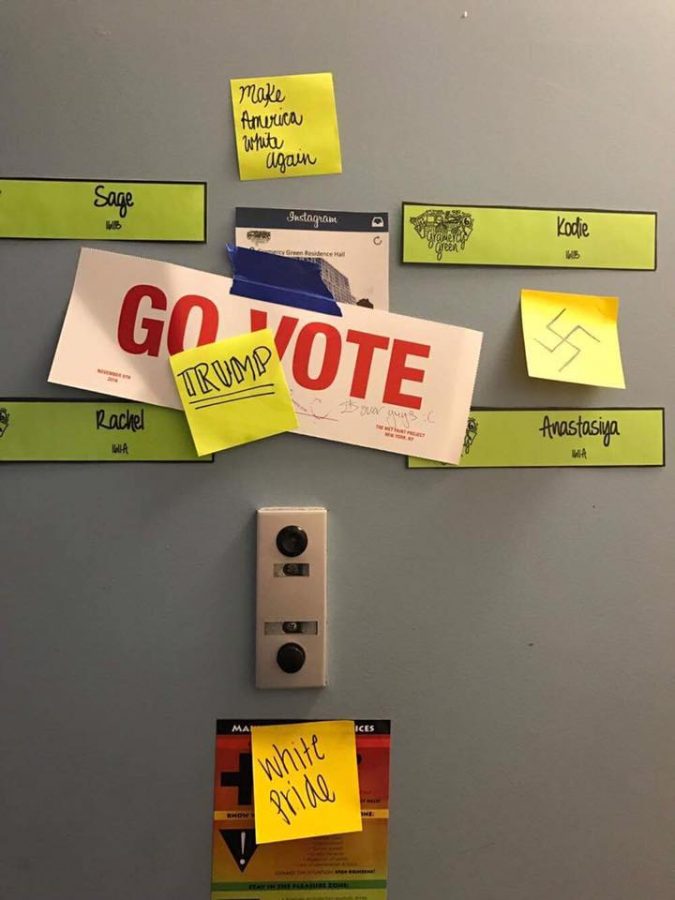100 Days of Post-Inaugural Hate
Courtesy of Anastasiya Muravyeva
The post-it notes covering Anastasiya Muravyeva’s door on Nov. 17 displayed rhetoric commonly employed by white nationalists, like “white pride” and “make America white again.”
February 1, 2017
Haters gonna hate took a new level after President Donald Trump’s inauguration. A surge in hate crimes plagued the country in the aftermath of Jan. 20, and NYU has not been excluded from this harmful rhetoric.
In an attempt to prevent future hate crimes at the university, the Asian/Pacific/American Institute launched a hate incident story collection, which is an online form for students, staff or any member of the general public to anonymously report specific post-inauguration attacks.
Director of Public Programs and Communications Amita Manghnani is the spokesperson for the A/P/A Institute’s story collection, and she said that this specific forum was created as a result of prejudice and hate-driven incidents around campus.
“After hearing the personal stories from NYU students and staff about their own bias-related experiences post-election, the Asian/Pacific/American Institute at NYU created a survey to begin to collect and archive stories of hate and intimidation on and around NYU’s campuses in Manhattan and Brooklyn during the first 100 days of the new presidential administration,” Manghnani said.
She said that A/P/A Institute’s goal for the 100-days project is to use the stories and data collected to call for the university to take precautionary measures in the future — the submissions will be available for NYU to review.
“The rise in hate incidents and attacks following the most recent presidential election has already been well documented and reported,” Manghnani said via email. “Our hope is that by documenting these stories we can advocate for proactive university responses and policies to address the rise of racist, anti-Muslim, misogynistic and other hate incidents.”
She said that the 100-days project was inspired by the Berkeley Hate Incidents Story Collection and Southern Poverty Law Center’s #ReportHate Intake Form, and the Southern Poverty Law Center has found over 1,000 reports of hate incidents since the election.
According to statistics provided by the F.B.I., the number of anti-Muslim hate crimes rose by 67 percent from 2015 to 2016. During 2016, NYU saw a hate crime of vandalism on the Muslim prayer room at Tandon, and within a week of the first incident, a post-it note with a swastika was found on a resident’s door.
Technologist Anirvan Chatterjee initiated the Berkeley project, and he said that collecting stories systematically is beneficial to the community because it records the hate incidents truthfully.
“First, it was important for us to generate our own evidence, to help show that we weren’t making things up and to separate out fact from fiction,” Chatterjee said. “[These incidents] happened to specific people at specific places at specific times — they weren’t just rumors or whining. Of the stories we collected, we ended up reporting on 14 different hate incidents that took place in the city of Berkeley within the first 15 days of the election, ranging from name-calling to rock-throwing to violent physical attacks.”
Chatterjee said the story collection was then used as a way to impact local policy, and that publishing the results in the local news helped open conversations with city officials about what the project revealed.
“Details from our report were included in two separate city resolutions,” Chatterjee said. “No mayor is proud of bad news like this, but we appreciated when the mayor of Berkeley tweeted out a link to a report.”
Chatterjee believes the A/P/A Institute’s project could positively affect the current climate at NYU, and he hopes that the project will receive all the support necessary for it to become a success: spread findings and influencing local action.
CAS freshman Catherine Zheng, an international student from Shanghai, said she and her friends experienced a racist verbal attack at the corner of Fifth Street and Third Avenue after President Trump’s inauguration.
“It was the first week after the inauguration,” Zheng said as she recounted the incident. “A white young male with a big traveler’s bag directly bumped into us when I was walking down the street with my other Chinese friend. We asked him something like ‘Why would you do that?’ and he said, ‘Because I’m a racist.’”
Because the man was not an NYU student, Zheng did not report her incident on the website. However, while she does not think reporting her specific experience will or can cause any change, she believes that the project could have a positive influence on the university as whole.
Email Coco Wang at [email protected].
























































































































































